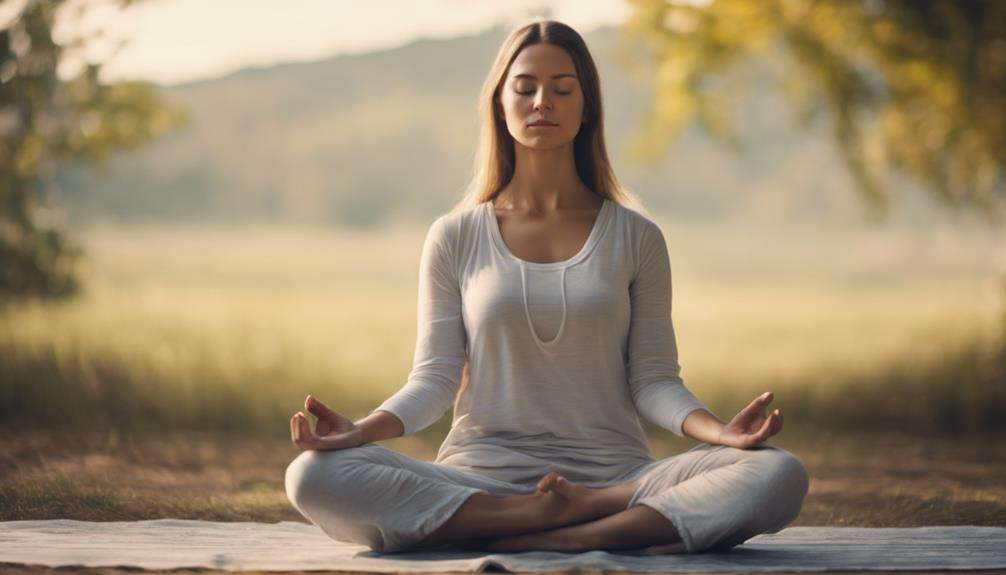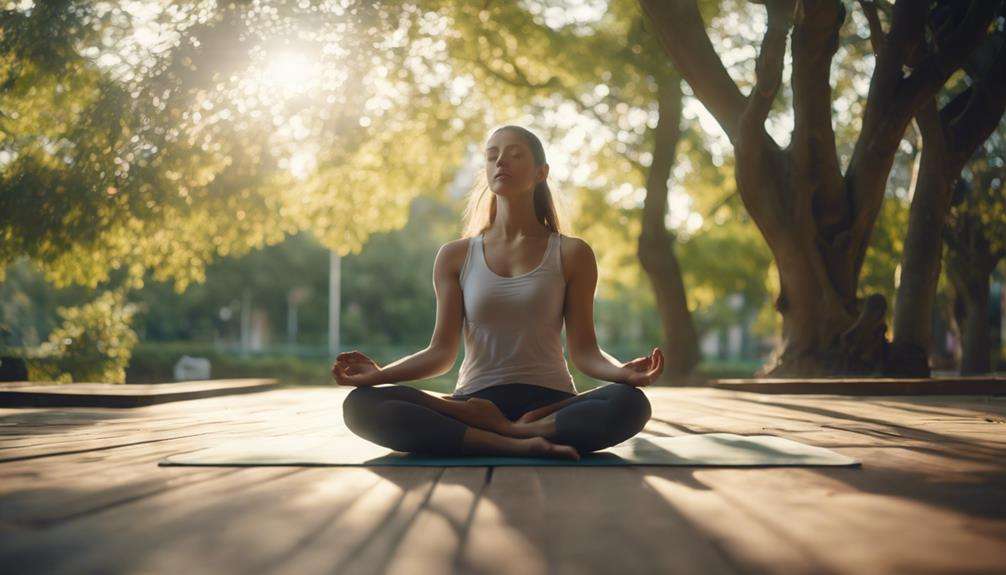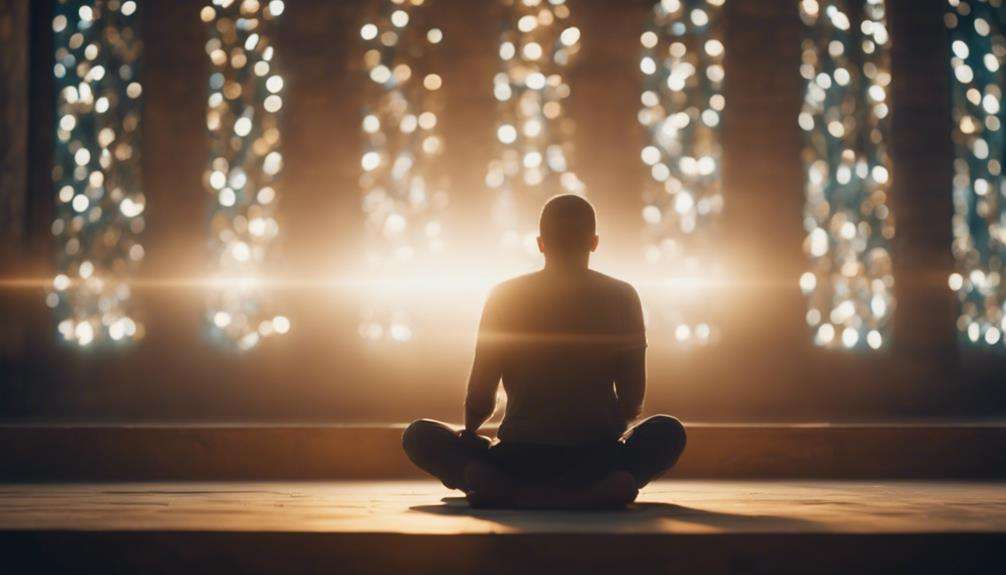Begin your journey towards a calmer mind and improved mental well-being with the top 5 meditation techniques for stress relief and overall health.
From deep breathing to body scan meditations, each technique offers unique benefits to help you combat stress and enhance your mental health.
Discover how these practices can transform your daily routine and bring a sense of peace and clarity to your life.
Explore the power of mindfulness and self-care through these meditation techniques designed to nurture your mind and body.
Key Takeaways
- Mindfulness meditation enhances mental clarity and emotional well-being.
- Deep breathing techniques activate relaxation responses, reducing stress and anxiety.
- Body-centered meditation like body scan relaxes body parts, reducing stress significantly.
- Visualization practices evoke relaxation through peaceful scenes, improving mental health.
Mindfulness Meditation
If you find yourself frequently overwhelmed by stress, practicing Mindfulness Meditation can offer you a powerful tool for relief and resilience.
Mindfulness meditation involves training your attention to focus on present moment experiences such as your breath, thoughts, sensations, and feelings.
Research has shown that mindfulness-based interventions like MBSR (Mindfulness-Based Stress Reduction) and MBCT (Mindfulness-Based Cognitive Therapy) are highly effective in reducing stress, anxiety, and depression.
Deep Breathing
After exploring the benefits of mindfulness meditation for stress relief, let's now shift our focus to the practice of deep breathing and its profound impact on promoting calmness and reducing stress.
Deep breathing is a powerful technique that activates the body's natural relaxation response, helping to alleviate stress and induce a sense of calmness. By taking slow, deep breaths and allowing the abdomen to rise and fall with each breath, you can effectively lower your blood pressure, reduce anxiety levels, and enhance your overall well-being.
This simple yet effective practice can be done anywhere, anytime, and is often paired with aromatherapy or soothing music for added relaxation benefits. Spending just a few minutes a day practicing deep breathing can lead to significant improvements in your mental health and stress levels, making it a valuable tool in your self-care routine.
Embrace the tranquility that deep breathing offers and feel the tension melt away as you nurture your mind and body.
Body Scan Meditation

Engaging in body scan meditation allows you to systematically focus on and relax different parts of your body, starting typically from the feet and moving upwards. This mindfulness technique helps you become more aware of bodily sensations, promoting relaxation and stress relief.
Here's why body scan meditation is beneficial:
- Enhanced Awareness: By directing your attention to each body part without judgment, you cultivate mindfulness and deepen your relaxation experience.
- Guided Audio Assistance: Body scan meditation can be practiced alone or with guided audio, enhancing the overall effectiveness of the practice.
- Stress Reduction: Regular practice of body scan meditation has been shown by research to reduce stress levels significantly.
- Emotional Well-being: Studies indicate that incorporating body scan meditation into your routine can improve emotional well-being and contribute to overall mental health.
Incorporating body scan meditation into your daily regimen can have profound effects on your mental and emotional wellness.
Visualization Techniques
Visualization techniques offer a powerful method for reducing stress and enhancing mental well-being by engaging in peaceful scenes or scenarios through the power of imagination. Whether practiced alone or with the aid of guided audio, visualizing calming settings like a serene beach or a quiet forest can significantly help in alleviating stress and anxiety.
By incorporating sensory details such as the sound of ocean waves, the smell of fresh pine, or the sensation of soft sand under your feet, your visualization experiences become more immersive and effective. These techniques aren't only about creating mental images but also about evoking emotional and physical responses that promote relaxation and improve overall mental health.
Loving-Kindness Meditation

To cultivate feelings of love and compassion towards oneself and others, consider practicing Loving-Kindness Meditation, also known as Metta meditation. This form of meditation involves repeating phrases of well-wishes and goodwill towards oneself, loved ones, acquaintances, and even difficult individuals.
Here are some reasons why you might want to incorporate Loving-Kindness Meditation into your routine:
- Increase Positive Emotions: By focusing on sending love and kindness to yourself and others, you can experience a boost in positive emotions.
- Reduce Depression and Anxiety: Studies have shown that regular practice of Loving-Kindness Meditation can help alleviate symptoms of depression and anxiety.
- Enhance Social Connections: This practice can improve your relationships and foster a sense of connection with others.
- Build Emotional Resilience: Engaging in Loving-Kindness Meditation can enhance emotional regulation, empathy, and overall well-being, leading to increased emotional resilience.
Frequently Asked Questions
What Kind of Meditation Is Good for Stress?
For stress relief, mindfulness meditation is powerful. It centers you in the present, easing tension. Guided imagery and deep breathing also help calm your mind and body. Try different techniques to find what resonates with you.
How Can I Reduce Stress and Improve My Mental Health?
To reduce stress and improve mental health, start with simple practices like deep breathing, body scans, and mindful activities. Incorporate yoga poses, nature walks, and journaling for added benefits. Remember, small steps lead to big changes.
What Are the Best Techniques for Stress Management?
When managing stress, consider various techniques like breathing exercises, mindfulness practice, body scans, progressive relaxation, loving kindness, visualization, mantra meditation, walking meditation, yoga poses, and guided imagery. Each method offers unique benefits for stress relief and mental health improvement.
How to Meditate for Mental Health?
To meditate for mental health, start with mindfulness practice. Focus on deep breathing, do a body scan, or try guided imagery. Incorporate loving kindness, mantra meditation, or progressive relaxation. Engage in yoga, walking, or visualization techniques.
Conclusion
In conclusion, incorporating meditation techniques into your daily routine can significantly improve your mental health and reduce stress levels.
Research has shown that just 10 minutes of mindfulness meditation a day can lead to a 58% reduction in anxiety levels.
By practicing deep breathing, body scans, visualization, and other techniques, you can experience a greater sense of calm and well-being.
Make time for yourself and prioritize your mental health with these effective meditation practices.






